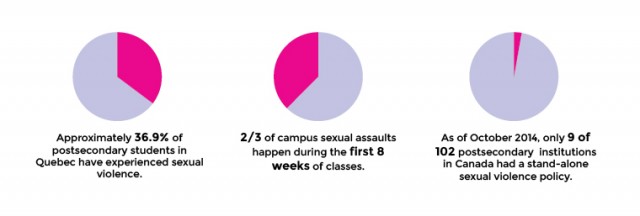Recently, incidents involving administrative mishandling of sexual assault allegations against professors, particularly at Concordia and McGill, have brought the conversation around sexual violence on Québec campuses back to the forefront. But this is by no means a new problem.¹ ² ³

According to a recent study, which surveyed over 9000 people connected to francophone universities across Québec, over one third of respondents – the majority of whom were women – reported having experienced some form of sexual violence on campus at the hands of another member of their university community.¹ Of the women in the sample, it was found that less than 10% had reported the incident(s) to the university¹ —this illustrates not only the culture of silence around sexual violence that persists in the university environment, but also serious institutional barriers around reporting sexual violence and being taken seriously. This is especially the case when there is an imbalance of power between the accuser and the accused – for example, when a student reports sexual harassment perpetrated by a tenured professor.
Concordia is no exception to the rule.
A recent survey on sexual violence, conducted by the Task Force on Sexual Misconduct and Sexual Violence, revealed that at least 1 in 10 Concordia students has experienced some form of sexual violence on campus.⁴ While Concordia does have a policy on sexual violence, its provisions are clearly insufficient to properly address the problem – in a recent report which evaluated universities across the country in terms of their sexual violence policies, Concordia received a D-, the lowest grade of all the universities included in the report.² Among other things, Concordia’s current approach to sexual violence notably lacks:²
- Mandatory sensitivity training on sexual violence.
- Protections for survivors against invasive questions regarding past sexual behaviour.
- A clause specific to situations involving drugs or alcohol.
- Clearly-defined timelines for the complaint process.
- An explicit acknowledgement of rape culture on campus.
- The expressed ability of survivors to speak openly about their experiences without repercussions.
We can’t let this continue to be the elephant in the room. It’s time to speak up, support each other, and create a necessary dialogue within and beyond our campuses about sexual violence and consent. We need to hold Concordia accountable to ensure that our school lives up to its stated goal of creating a safe environment for everyone!⁵






